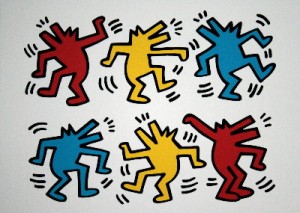Book Review: Howling for Dollars
 |
| Petits Loups by Keith Haring |
The Hunger of the Wolf by Stephen Marche
Lycanthropy has been a symbol of man's hunger for the wild, a yearning to commune with one's more primal urges; to embody the feral wolf, rely only on one's instincts and savor the blood of the kill, free from the bonds of humanity. Of course the transmogrification can last for only a short while (i.e.; during the full moon). Humans must never to a primitive spirit, perpetually regress, but should constantly evolve toward a supreme ethos. Right? Well I guess that may be debatable. In any case, the propensity for Man to howl at the moon is a waning rite and one that, in time, if we are to believe Stephen Marche in his latest novel, The Hunger of the Wolf, may be obliged to wax, if we care to remain a driven and purposeful species.
Like Fitzgerald's definitive novel of American wealth and avarice, Marche's chronicle is narrated not by a family member but rather a close observer of the affluent clan and its mammon. Journalist James Cabot hails from a family of caretakers who share the parcel of homesteaded land (eight thousand acres, "a province within a province") in Northern Alberta, that Dale had acquired in the 1917 Canadian "land bonanza", in return for the infrequent seasonal maintenance of the North Lake cottage. The narrator is tethered, in part, to his parent's billionaire employer through his generational counterpart, Ben Wylie. Alas, poor Ben turns up naked and lifeless in the chilly white powder of the Canadian wilderness; this on the first page of the novel, no less. Though James has met Ben only once -- at a party in his rich friends', Kate and Leo's, New York apartment-- he feels as if he's known him his whole life. Curiosity abounds. Journalistic instincts prevail. An investigation ensues.
Poring over the ephemera from the Wylie cottage, James cobbles together the dark fable explicating the rise of one of the richest families in North America. Here is where lycanthropy figures in. Cages, dank in the earthen basement of 17 Flora Avenue, lie in wait for both Dale and brother Max. The curse, like the menses of their mother, is cyclic. Lunar. It empowers Dale; Tamed, it becomes the catalyst of avarice and monetary success. But Max cannot harness his lupine essence. He instead embraces the brutality and freedom it offers. The affliction is inherent it seems, as Dale's son, George, carries on in his father's moonglow. Then comes Ben, along with his adopted sister, Poppy. Their lives from birth are full of everything; and nothing. Ben will chase life itself for a connection to something genuine, something primal, until his frozen demise.
Marche's work is rife with symbolism as is any other fable. The Hunger of the Wolf marks the rise of mid-century capitalism, of mergers and acquisitions driven by men's naked ambition, greed, desire. But not merely those components, of their women as well, their willingness to allow them to descend into the basement and howl. By the time (the early '60s) George marries his true love, pianist Lavinia Thibodeau, women are not just appeasing, but embracing the wild nature of their male counterparts. When he finally reveals his true nature to Lavinia, George is elated, her acceptance is everything:
"'Are you alright?' he asked. She eventually answered, "It's like a fairy tale." The smooth post-bestial satisfaction, aglow with its new relaxation and the city light and a woman he loved who knew his nature, may have been the happiest morning of George's life."
A fairy tale. That is what Marche has written. It is dark, foreboding, bestial. There are caveats throughout. If the reader can suspend disbelief for a while, Stephen Marche will take you on a fantastical tour through what might have been a wondrous place if it had lasted. If only the moon mustn't wane. But it must. If only we all could keep howling. But we can't-- or perhaps more precisely, we won't.
©2014 by Michael Jones
Comments
Post a Comment